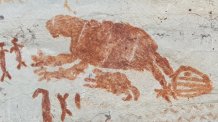Articles

Ice-Age megafauna displayed in the pictographs of the Colombian Amazon dating to 12,500 years ago potentially depicting a now-extinct giant sloth (Megatherium).
Major new study will rewrite history of human colonisation of South America
A major new study will uncover the secrets of how humans colonised one of the most challenging landscapes on earth - and the legacy of their actions on today’s plants and wildlife.
South America was one of the last places on Earth to be occupied by humans, who had to learn how to live in extreme places, including rainforests, at the same time as major environmental changes were taking place.
Experts will discover why the arrival of humans led to the loss of 80 per cent of megafauna (Ice Age large mammals) in the region, and how and when they started to domesticate plants including squash, yams, sweet potato, arrowroot and cacao plants so they could be used for food.
The five-year project, called, The End of the Journey: The Late Pleistocene-Early Holocene Colonisation of South America, is funded through a €2,498,590 prestigious European Research Council Advanced Grant won by University of Exeter archaeologist Professor José Iriarte.
This is the first time ancient human migration across north-western South America will be examined in detail. The project brings together archaeologists, archaeobotanists, zooarchaeologists, palaeoclimatologists and palaeoecologists, who will use state of the art technology to study ancient environmental DNA and isotopes. The research will involve experts from the University of Exeter, Universidad de Antioquia and Universidad Nacional de Colombia in Colombia, the Universidade De Sao Paulo in Brazil, Kobenhavns Universitet in Denmark and Max-Planck-Gesellschaft Zur Forderung Der Wissenschaften E in Germany.
Professor Iriarte, said: “Our findings will re-write the history of how South America, the last continental terra incognita (other than Antarctica), constituting a virtually unprecedented migration of modern humans across richly diverse, empty landscapes at the end of the last Ice Age was colonised by humans. They will shed new light on how humans adapted and colonised the landscape, how they hunted, the demise of the last Ice Agelarge animals and the beginning of plant cultivation and domestication. It will also tell us more about how climate change shaped human dispersion in the region.’
“This work will tell us if these early colonists were highly mobile, big-game hunters or foragers subsisting on a wide variety of local foods. It will also show how they adapted to the climate and when and which plants were first cultivated and domesticated.”
The Americas were colonised sometime between 25 and 15 thousand years ago by humans who travelled through the Pacific Rim corridor from northeast Asia. As they moved through the continent climate change meant glaciers in the region melted, Andean tree lines shifted, savannah and seasonal forest boundaries moved and forest composition changed.
Researchers will survey sites including Chocó lowland forest strip along the Pacific coast, lakes and the Andean Forest. They will discover which vegetation grew in the region at the time – and the likely diet of humans - by examining seed and pollen remains, as well as animal remains.
University of Exeter historian Professor Jane Whittle has also been awarded an ERC Advanced Grant.
Professor Andrew Thorpe, Pro-Vice-Chancellor and Executive Dean for Humanities, said: “These major grants are outstanding achievements in this extremely competitive awards scheme, and show the sheer quality of the Humanities at Exeter. This scheme is intensely competitive, with a success rate of around 10 per cent. It would have been big news, therefore, if one colleague had won an award: for two to do so in the same round is nothing short of remarkable. It shows clearly the excellence and eminence of Jane and Jose. But it also demonstrates very clearly the continuing excellence of the Humanities at Exeter. With scholars of this quality, the Humanities can face the future with confidence.”
Date: 1 April 2019
